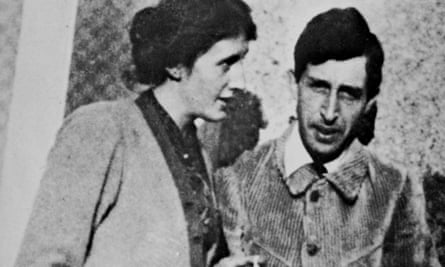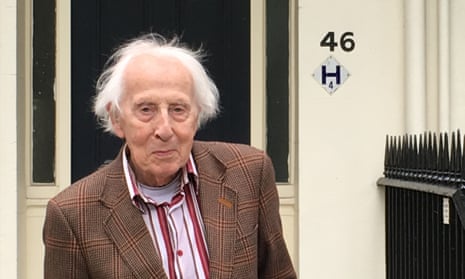The publisher and editor Cecil Woolf, who has died aged 92, was a nephew of Virginia and Leonard Woolf and the last person to have known Virginia Woolf personally, taking her tea in bed as a little boy. From his house in Mornington Crescent, north London, he ran a small publishing company, Cecil Woolf Publishers, producing books including the Bloomsbury Heritage Series, a collection of monographs exploring all aspects of Virginia Woolf and her fabled circle.
A kind, charming and erudite man, in later years he spoke regularly at Woolf conferences and extended the hand of friendship to young scholars and writers, inviting them into the home he shared with his wife, the biographer and critic Jean Moorcroft Wilson, where art by Vanessa Bell and Duncan Grant adorned the walls and dinner was served on the table on which Virginia and Leonard Woolf had run the Hogarth Press.
Cecil was the son of Philip Woolf (the youngest brother of Leonard) and his wife, Barbara (nee Lownds), and was born and brought up in Buckinghamshire on the Waddesdon estate, home of the Liberal politician James de Rothschild, where Philip was estate manager. He had two sisters, Philippa and Marie.
Educated at Stowe school, Buckinghamshire, and clearly a bright student who at another time would have gone on to university, he instead enlisted in the army, joining the tank regiment as a private and fighting in Italy. He returned in 1947 as a captain, fluent in Italian, and had a brief career in the City at Woolf, Christie, his uncles’ stockbroking firm. His sights set on publishing, he left to become an antiquarian bookseller.
It was a trade to which Woolf was no stranger, having worked with Leonard at the Hogarth Press (he also shared Leonard’s London house for nearly a decade), and in 1960 he set up his own imprint. The first in the Bloomsbury Heritage Series appeared in 1994 – Virginia Woolf’s previously unpublished juvenile “novel” A Cockney’s Farming Experiences – and this was followed by more than 80 further volumes about Woolf and the Bloomsbury Group, a rich resource for scholars and general readers alike.
He also published an extensive list of first world war poets, as well as his own writings – including, in 2017, a short memoir, The Other Boy at the Hogarth Press: Virginia and Leonard Woolf As I Remember Them.

The list’s liveliness owes much to the efforts of Moorcroft Wilson, who shared Woolf’s life and work from 1972. They met in the reading room at the British Museum, a chance encounter when she was working on her PhD thesis on the forgotten war poet William Watson, about whom Cecil had written. He told her he preferred DH Lawrence to Virginia Woolf but the relationship survived and the couple married in 1981, after the birth of four of their five children.
Her doctorate complete, Moorcroft Wilson began a career in academia – first in Munich, later at Birkbeck in London – and at Woolf’s suggestion added to the CWP War Poets series with volumes on Isaac Rosenberg and Charles Hamilton Sorley. While she personally moved to larger publishers (“he forgave me”) the couple worked creatively on a variety of titles.
A series of Authors Take Sides was inspired by Nancy Cunard’s pamphlet on the Spanish civil war, and included a volume of writings on the Gulf and Iraq wars (2004). The Falklands provided fertile ground, with two books on the sinking of the Belgrano: Tam Dalyell’s Thatcher’s Torpedo (1983) and On The Spot (1984), by Diane Gould, the schoolteacher whose interrogation of Margaret Thatcher on the current affairs TV programme Nationwide so discommoded the prime minister. Death of a Rose-Grower (1985), by Graham Smith, about the murder of the anti-nuclear campaigner Hilda Murrell, was another topical bestseller.
Moorcroft Wilson reflected on the decades-long collaboration with her husband: “We had an extraordinarily good working relationship … My great wish is that Cecil Woolf Publishers continue, and I have every intention of doing my utmost to ensure it does, either with me or our children, or with someone else who shares the same values and ideals.”
As to Virginia Woolf, Cecil took real pride in the relationship, attending many conferences, where he spoke of early memories of staying with the Woolfs at Monk’s House, Rodmell, near Lewes, or later at Tavistock Square in Bloomsbury, overcoming his natural diffidence as his wife dealt with “circles of adoring women”. But he had a hard time dealing with those who blamed Leonard for Virginia’s death, insisting “he saved her time and again, sitting there feeding her spoonful by spoonful because as she got thinner and thinner, she’d get depressed”.
Woolf remembered his aunt as “amusing, funny – a very motherly sort of person”, and his last sight of her was up a tree picking apples. He was 14 and at school when she died; the English master, G Wilson Knight, a colleague of Quentin Bell, told him of “Virginia’s last walk to the Ouse”.
Woolf was an “amazingly approachable gem of a man”, according to the writer Paula Maggio, who was introduced to him as a postgraduate at a conference in 2007. She found in him a mentor and a friend, and went on to contribute five volumes on Woolf for the Bloomsbury Heritage Series.
He was patient with the authors he published, working painstakingly as an editor to ensure their book was the best it could be. Drew Shannon, another scholar who became a good friend, described Woolf as “our link to a past that we all long to connect to, and such a force of nature in our present”.
His first marriage, to the Italian actress Malya Nappi, ended in divorce. He is survived by Jean and their children, Kate, Philip, Emma, Alice and Trim.

Comments (…)
Sign in or create your Guardian account to join the discussion